University of Papua New Guinea jointly commemorated the United Nations International Day of Non-Violence on with the Indian High Commission at the bust of the champion of non-violence, civil disobedience Mahatma Gandhi of India at the Waigani Main Campus early this week.
The resounding message, at the small but significant commemoration, was that much can be achieved with non-violence, without unnecessary bloodshed and the change must begin on the inside with individuals taking personal responsibility and leadership.
The United Nations General Assembly (UNGA) established the International Day of Non-Violence on 15th June 2007 to be observed on 2nd October annually – the birthday of Mahatma Gandi – to raise awareness about his message of non-violence.
“Be the change you wish to see in the world” attributed to the late Mahatma Gandhi was the main resounding quotation in memorial tributes by both Indian High Commissioner to PNG Ravindra Nath and UPNG Acting Vice Chancellor Dr. Cecilia Nembou.
Dr. Nembou said that that this day established on the birthday of this great champion of non-violence and civil disobedience is very relevant to PNG today with domestic violence, sorcery-related violence and ethnic violence blatantly rampart.
“PNG should consider the life and model of Dr. Mahatma Gandi. We can and should desist from violent ways and means and address our conflicts with consensus and peaceful means,” she said.
Earlier High Commissioner Nath, highlighted the origins and definition of Mahatma or
“Great Soul” accorded to Gandhi who was born Mohandas Karamchand Gandhi on 2nd October 1869 in Porbandar State, India and died from bullets wounds by an assassin on 30th January 1948 at the age of 79.
A lawyer who studied in London and practiced in South Africa, Gandi’s exposure to racial discrimination in that African country began his resistance to racial discrimination with “satyagrah” which means civil disobedience – the cornerstone of his activism.
He brought that to India and used that to mobilise millions, establish the Indian National Congress, and forge a path for Great Britain to grant India Independence on 15th August 1947 without violence. Britain had ruled India for 89 years since 1858.
“As we reflect on his legacy, let us embrace his teachings of peace and justice, striving for unity in our divided world,” said His Excellency Nath. Gandhi believed that true change begins with emphasizing self discipline, humility and compassion and his message of “be the change you wish to see in the world” continues to resonate to this day, he added. The quote, according to Author Joseph Ranseth, is a collapsed version of what the infamous Indian Leader said “revealing a profound spiritual truth that what we see in the world is no more and no less a reflection of what is unseen inside of ourselves”.


